How Fast Do Pothos Grow? (+How To Grow Them, Bushy And Long)
Whenever you buy Pothos, you wonder about its growth rate to provide them with the best-growing conditions and help them thrive. So, how fast do Pothos grow? Let’s understand.
Pothos can grow exceptionally fast. They develop around 12-18 inches monthly if they are healthy and receive the correct growing conditions. However, factors like seasons, Pothos varieties, and cultural practices can affect the growth rate of Pothos.
I have been growing Pothos for several years, and during my 12 years of gardening, I have noticed several factors affecting its growth rate. Stick to this article until the end to learn how fast Pothos grow, the factors affecting the growth rate, and how to make them grow fast, bushy, and long.
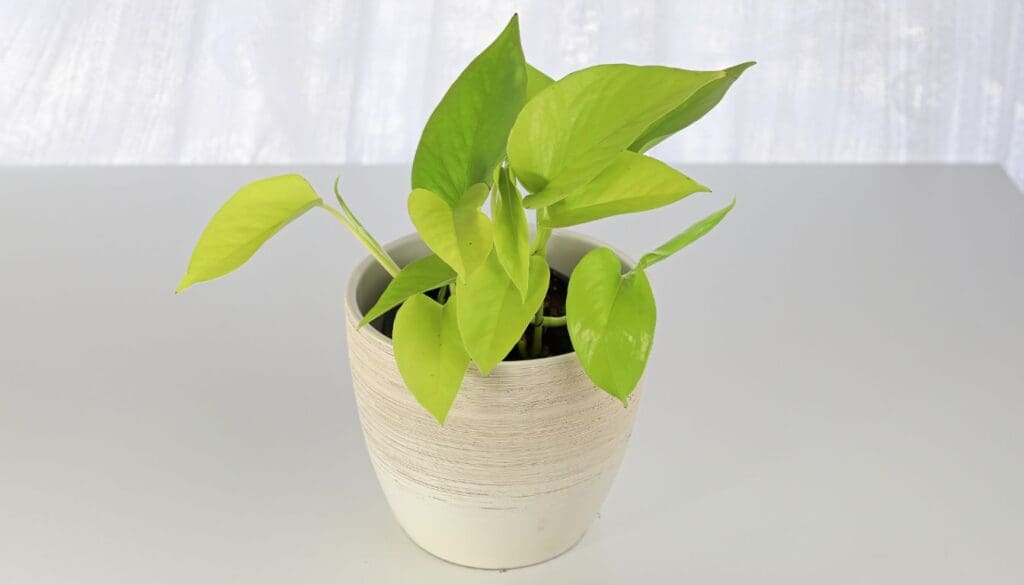
Please note: Simplify Plants is reader-supported. Some links in the post are affiliate links and I get a commission from purchases made through links in the post.
The average growth rate of Pothos
Pothos is a natural fast-growing plant.
In the wild, Pothos can grow around 60-80 feet tall.
Wild Pothos reach their maximum size in 3-5 years.
It is because that is their native land, and they receive all the requirements correctly.
But indoors, Pothos don’t receive their best growing conditions.
Though we try to provide these requirements accurately, sometimes, we fail or cannot give the best 100%.
Indoors, Pothos can grow 1 to 1.5 feet monthly during spring and summer and only 2 to 3 inches during dormancy.
Pothos growing season lasts roughly 6 months.
The plant will develop only around 6 feet long during the growing periods.
However, the growth rate does not remain the same all the time.
Several factors can affect Pothos’s growth rate.
Factors affecting the growth rate of Pothos
Several factors can affect the growth rate of Pothos.
These factors can either reduce or increase the growth rate.
I get a lot of DMs where readers, especially beginners, ask me to share these factors as they don’t understand how to make them grow faster.
Once you learn the factors, you can easily take steps to increase their growth.
Let’s have a look at these factors in detail.
1. Different Pothos varieties affect the growth rate
Pothos have several varieties, and different varieties’ growth rates will differ from each other.
Here is a list of some Pothos varieties and their growth rate every month during the growing seasons:
- Golden Pothos: 12-18 inches per month
- Neon Pothos: 12-18 inches per month
- Satin Pothos: 1 foot per year
- Marble queen: 12 inches per month
- Jade Pothos: 18 inches per month
- Pothos N’joy: 10-12 inches per month
- Hawaiian Pothos: 12-18 inches per month
- Manjula Pothos: 12-18 inches per month
The varieties with solid green leaves grow faster than the variegated varieties.
Due to the leaf patterns, they struggle for chlorophyll production.
2. Seasonal factors affect Pothos growth rate

Pothos is a tropical plant and grows best when the temperature is warmer and above 65°F.
Spring and summer are the best seasons for Pothos.
To be precise, Pothos’ growing season lasts from mid-spring to mid-fall.
Pothos grow faster throughout the growing seasons.
Pothos growth rate decreases in the fall and stops in winter.
The light and temperature levels will reduce, and so will the plant’s metabolism to grow actively.
3. Cultural practices affecting the growth rate of Pothos
The next factor that can affect the Potho’s growth rate is cultural practice.
The growth rate of Pothos can be reduced or increased based on how you provide basic needs.
Let’s have a look in a bit more detail at how these cultural factors affect the growth rate of Pothos:
Light conditions affecting Pothos growth rate
Pothos require 8-12 hours of bright indirect sunlight per day.
The plant can also grow under low lights. Pothos getting bright indirect sunlight for 10-12 hours will grow faster than those under low lights.
Watering habits affecting Pothos growth rate
Pothos need consistent soil moisture with a dry spell before every watering.
Water your pothos whenever the top 1-2 inches of the soil dries.
Irregular watering reduces the growth rate, but regular watering with consistent soil moisture increases the growth rate.
Pothos soil quality affecting its growth rate
Pothos can survive in any soil but thrive best in well-drained, fertile soil with 6.1-6.8 pH levels for adequate growth.
Poor soil quality can reduce the growth rate if it holds extra moisture, drains faster, or the nutrient level gets imbalanced.
Fertilization affecting Pothos growth rate
Pothos don’t need to be fertilized if the soil provides adequate nutrients.
Once the soil depletes, fertilization is needed for good nutrition.
However, Pothos will continue growing without feeding, but the rate will be slower than a well-fertilized plant.
Rootbound affects Pothos growth rate
While Pothos can tolerate being rootbound, not for too long.
The more rootbound it stays, the more slowly it will grow due to the lack of space in the pot.
Repotting will provide space to the soil, and new soil packed with fresh nutrients will increase its growth rate.
Temperature affecting Pothos growth rate
Pothos require a warm temperature ranging between 65-85°F.
Low temperatures reduce their growth, and warm temperatures increase it.
High, scorching temperatures also reduce the growth rate because of dry air and repeated dehydration.
Humidity levels affecting Pothos growth rate
Indoors, provide Pothos with 50-60% humidity levels.
While Pothos can grow with 50% humidity, the growth rate will be slower than those getting slightly higher humidity.
Pruning can affect the growth rate of Pothos.
Pothos will not slow down or stop its growth if you don’t prune, but pruning can stimulate and make it grow faster than its average growth rate.
I have done a few wrong cultural practices as a beginner, and after years of experience, I now maintain the optimal conditions.
4. Infestations affecting Pothos growth rate
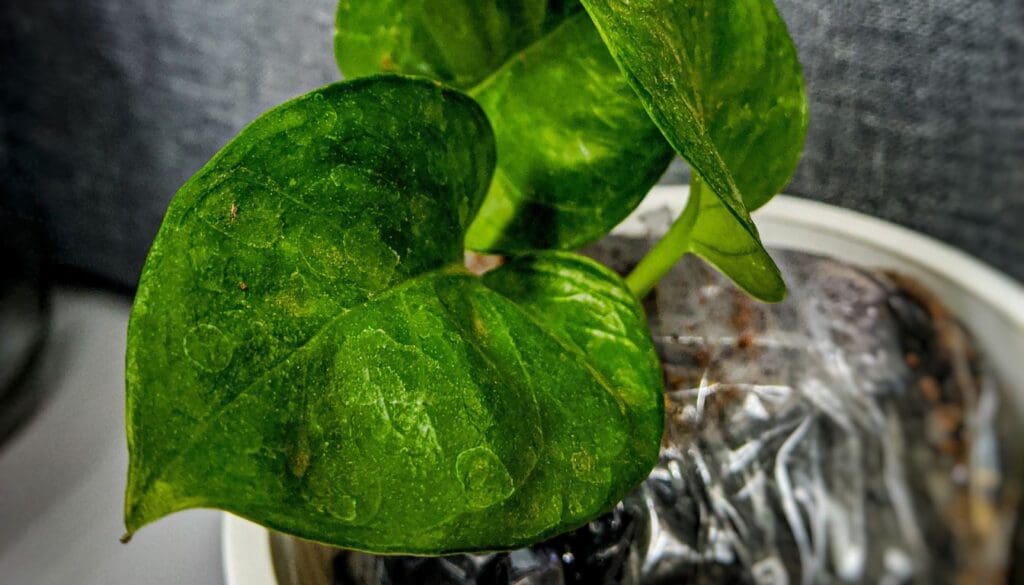
Not following the correct cultural practices for too long and ignoring the signs of stress that Pothos displays will weaken the plant.
This makes the plant susceptible to pests and diseases.
Pests like aphids, spider mites, mealybugs, and scale insects suck the plant sap and dehydrate and stress the plant badly, further stopping the Pothos from growing.
Diseases like powdery mildew, leaf spot, bacterial and fungal infections can also stop the plant from growing.
A healthy Pothos grows faster than the infested one.
Once infestations occur in Pothos, reviving and improving their growth rate becomes difficult.
If your Pothos grows slowly despite following the proper requirements, check the plant closely for infestations.
8 ways to encourage fast and fuller growth in Pothos by providing the best-growing conditions
Pothos varieties and seasons affecting the growth are natural.
You don’t have anything to do here. But cultural practices are performed by us.
To enhance Pothos growth rate, you can improve the cultural practices and provide them with the suitable growing conditions.
Below are the best-growing conditions you can provide to your Pothos to encourage fast and fuller growth:
1. Let them have bright indirect sunlight for 10-12 hours for quick growth
While Pothos can survive under low lights, let your plant receive 10-12 hours of bright indirect sunlight daily for faster growth.
A south or west-facing window provides maximum sunlight and has the risk of sunburns.
Put up sheer curtains or Venetian blinds.
An east-facing window can give your Pothos gentle sunlight throughout the day.
2. Maintain good hydration to maximize Pothos growth
Maintain proper hydration and consistent soil moisture to increase the growth rate of Pothos.
Always check the moisture level and water your plant whenever the top few inches have dried.
Make a watering routine once you know enough about your Pothos’s absorption rate.
I water my Pothos plant every 5-7 days during the spring and summer and every 10-14 days during the fall and winter.
I also check the moisture level before watering and, based on this, sometimes increase the frequency in summer and skip 1-2 watering sessions in winter.
3. Use well-drained, fertile soil to optimize Pothos growth rate
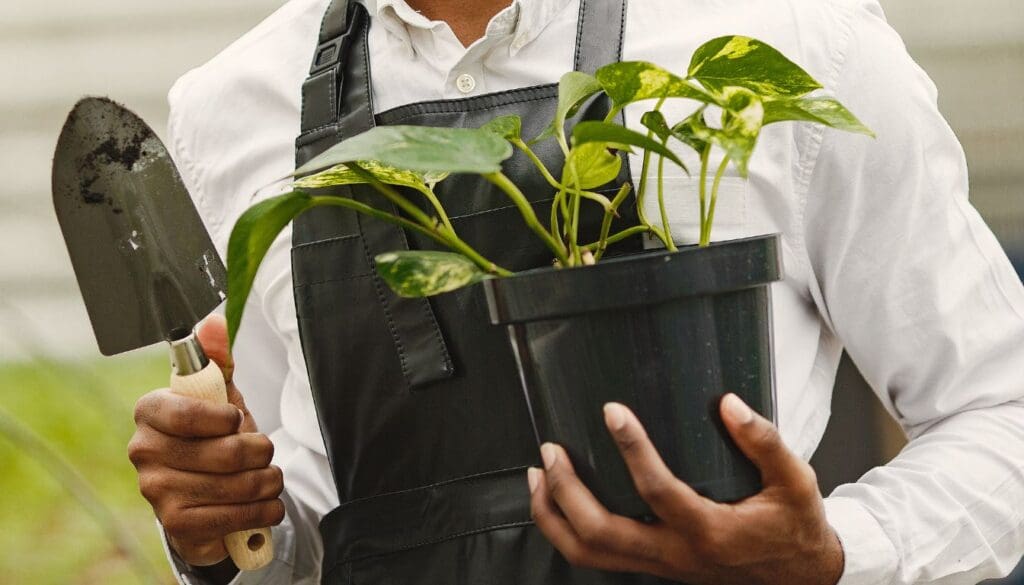
While Pothos will survive in any soil, well-drained fertile soil is what increases the growth rate.
The soil should drain excess water and hold sufficient moisture for hydration while also being fertile to provide adequate nutrients.
Also, ensure the pH level is around 6.1-6.8.
Two easy soil mix recipes for Pothos are:
- 2 parts peat, 1 part perlite, and 1 part pine bark fines.
- 2 parts Miracle-Grow potting mix and 1 part perlite
You can also use store-bought soil mixes having additional fertilizers.
Please go through our Soil article for more options.
With everything perfect and on point, Pothos will grow and develop faster.
4. Fertilize Pothos regularly during the active months for good nourishment and fast growth
Although Pothos can survive without fertilizing, it helps the plant to grow fast, strengthens immunity against diseases, and enhances its appearance.
Feed your Pothos with a balanced liquid fertilizer (10-10-10 or 20-20-20 NPK levels) for a fast and bushy growth every 4-6 weeks.
Feed it 1-2 times a year with a slow-release fertilizer.
Always fertilize during the spring and summer. Reduce feeding during fall and quit in winter.
5. Maintain warm temperatures and humid environments to boost Pothos growth
Pothos need the temperature to be between 65°F and 90°F.
For faster growth, try to maintain the temperature around 70-90°F.
Around 50-60% humidity levels ensure good growth in Pothos.
Maintaining 70-80% humidity levels with good airflow to make it grow faster.
Keep the windows open or run a fan near your plant for good airflow.
When humidity levels are too high, increase air circulation to prevent infestations.
6. Prune your Pothos regularly for bushy tips and enhanced vine length

While Pothos won’t grow slowly if you don’t prune, it can encourage faster and bushy growth.
You can prune your Pothos every 2-3 months during the active months.
It will activate the plant’s growth hormone, stimulate its growth, and make it more fuller and bushy than before.
Prune off the leggy stems and some overgrown leaves for new, faster, and fuller growth.
7. Repot your Pothos every 1-2 years when they go rootbound for faster growth
When the roots of your Pothos get more room to grow after repotting, your plant will resume its fast growth.
Choose a 1-2 inch bigger pot than the existing one. Use a new soil mix, as the old one will deplete and no longer help the plant grow well.
Repotting can be stressful. Therefore, do it during the growing season.
Pothos will grow actively and efficiently recover from transplant shock.
8. Check out for Pothos pests and diseases and take immediate action
Follow the basic care properly, and your Pothos will never be affected by pests or diseases.
Still, keep an eye out for these infestations.
Take immediate action by quarantining the plant, removing the infected parts, spraying neem oil or insecticidal soaps, and applying bactericides and fungicides.
Early intervention will eliminate the issue and help Pothos regain its growth speed.
My experience while growing pothos
I have done a few things wrong initially as a Pothos grower.
But after years of experience, I have improved and provided the best care to my Pothos.
I kept track of it, and here’s what I have seen before and after improving the cultural practices:
| Light | Water | Soil conditions | Temperature | Pruning | Plant size |
|---|---|---|---|---|---|
| I used to keep Pothos under low lights. | I used garden soil mixed with some coarse sand. | I provided bright indirect sunlight. | Pothos used to stay in an AC room where the temperatures were low most of the time. | I did not prune them at all for the first 2-3 years. | My plant used to grow only 1-2 feet a year. |
| I watered Pothos whenever the top few inches dried | I watered Pothos whenever the top few inches have dried | I used well-drained, fertile soil with 6.1-6.8 pH levels | I maintained 70-90°F temperatures | I pruned every 2-3 months during the growing seasons | Now my Pothos grows 10-15 feet in one year |
As you can see, Pothos have grown faster under optimal growing conditions but developed very slowly under the wrong conditions.
This is how these cultural practices affect the growth rate of Pothos, and you need to improve them to encourage a fast growth rate.
4 Additional tips for faster growth in Pothos
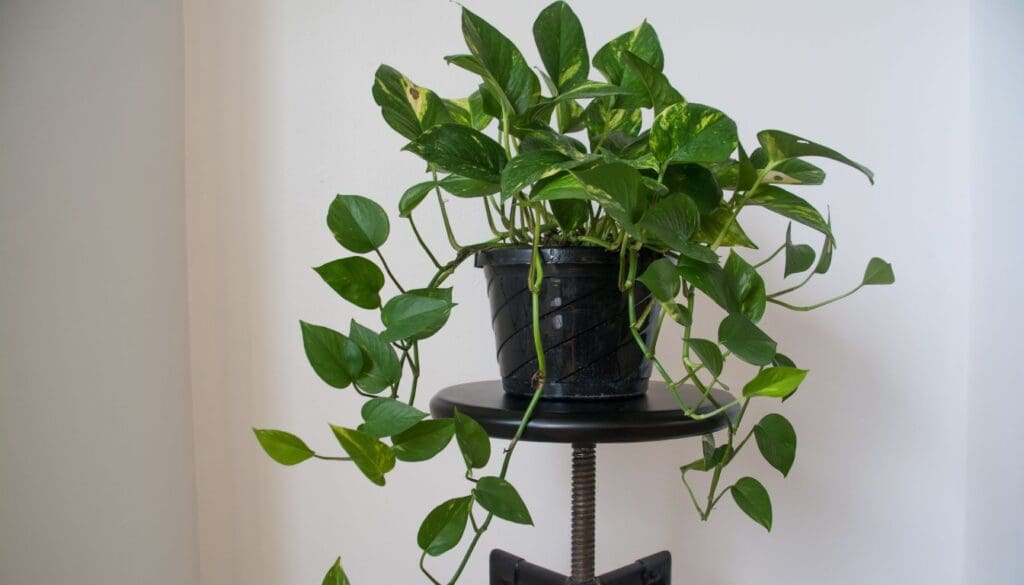
Here are some extra tips I personally follow for Pothos:
- I’ve observed that Pothos cuttings grow faster in water than soil, possibly due to high humidity and ample water access. I use the aquarium’s water for faster growth as it is nutrient-rich, with the temperature set to 75-77°F, another advantage for these warm weather lovers. Later, transfer the plant to the soil once the roots develop.
- Dip the cuttings into rooting hormones for faster root growth before planting them into soil or water.
- Make your Pothos climb instead of hanging them. Since climbing is their nature, they will grow faster with support structures.
- Use support structures, like trellis or moss poles, for these trailing plants to help them climb. It also adds aesthetic value to your room. One extra benefit of using moss poles is it can increase the humidity levels for Pothos, another factor that can increase its growth rate.
Final thoughts
Pothos is a very fast-growing houseplant. During the active months, Pothos grow about 12-18 inches monthly. However, several factors can affect the plant’s growth rate. Natural factors are the Pothos varieties and time of the year. Different Pothos varieties have different growth rates. Pothos grow slowly in the fall and winter but faster during the spring and summer.
Cultural factors include light, water, soil, fertilization, temperature, humidity, repotting, and pruning. If these are followed correctly, Pothos will grow faster. Mess up with these, and your Pothos is going to grow slowly. For faster growth, provide the basic needs correctly: indirect sunlight, proper hydration, letting the top few inches of the soil dry before watering, and using well-drained fertile soil.
During the growing season, fertilize Pothos every 4-6 weeks with a balanced liquid fertilizer, repot every 1-2 years, and prune every 2-3 months. To make Pothos bushy and long, provide support structures like moss poles and trellises, propagate cuttings initially in water and later transfer them to the soil, dip them into rooting hormone, and make your Pothos climb instead of hanging.
Why is my Pothos growing slowly?
Incorrect light, water, soil, temperature, or humidity are some of the primary causes of Pothos not growing. Adjust these growing conditions and troubleshoot the causes to make your Pothos grow faster.
How fast do Pothos grow in water?
Within 7-14 days, you will notice new root growth in Pothos. Adding some liquid fertilizer and providing indirect light can help them grow faster. New leaves will appear within 4-5 months.
Which Pothos are the fastest and slowest growers?
The Pothos with green leaves grow very fast. The variegated Pothos are slow-growers because they cannot photosynthesize as effectively as the solid green Pothos.
Reference: Pothos Wikipedia
Recommended Garden Supplies
| Product Image | Our Recommended Gardening Supplies | Check Offers! |
|---|---|---|
Top Top
Top
Top
Top
Top
Top
Top
Top | rePotme Houseplant and Tropical Classic Potting Soil Mix | Check Offer On Amazon |
 Top
Top
Top
Top
Top
Top
Top
Top | Espoma Organic Indoor Plant Food | Check Offer On Amazon |
 Top
Top
Top
Top
Top
Top
Top
Top | GooingTop LED Grow Light 6000K Full Spectrum Clip Plant Growing Lamp | Check Offer On Amazon |
 Top
Top
Top
Top
Top
Top
Top
Top | Soil Moisture Meter | Check Offer On Amazon |
 Top
Top
Top
Top
Top
Top
Top
Top | Govee Hygrometer Thermometer, Bluetooth Enabled! | Check Offer On Amazon |
 Top
Top | LEVOIT Humidifiers for Large Room(Best For Plants) | Check Offer On Amazon |
 Top
Top
Top
Top
Top
Top
Top
Top | Upgraded DIY Automatic Drip Irrigation Kit, 15 Potted Houseplants Support | Check Offer On Amazon |
 Top
Top
Top
Top
Top
Top
Top
Top | Stainless Steel Heavy Duty Gardening Tool Set | Check Offer On Amazon |
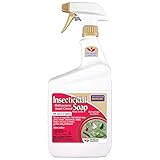 Top
Top
Top
Top
Top
Top
Top
Top | Bonide Insecticidal Soap | Check Offer On Amazon |
 Top
Top
Top
Top
Top
Top
Top
Top | Bonide 32 oz Spray Neem Oil for Organic Gardening | Check Offer On Amazon |
 Top
Top
Top
Top
Top
Top
Top
Top | Garden Safe Fungicide | Check Offer On Amazon |




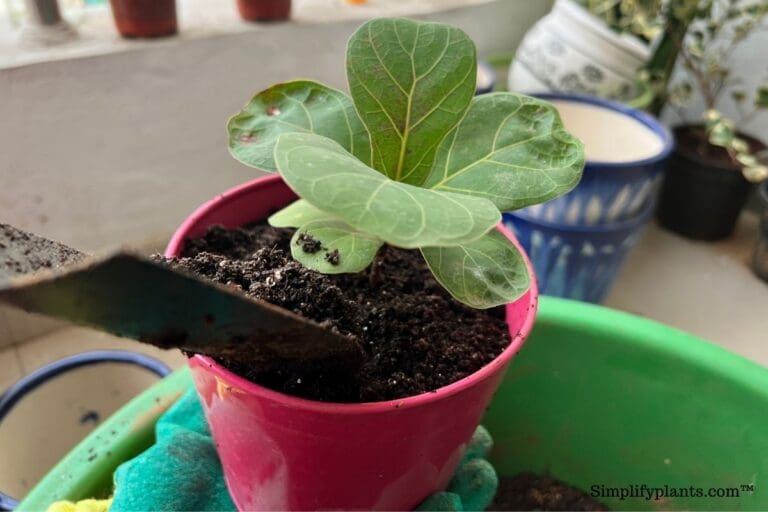

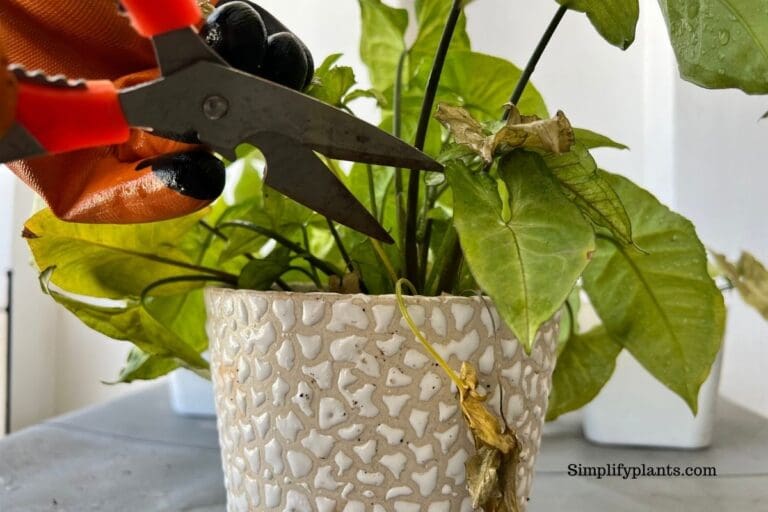
I love this information. I think I will make index cards for each of my plants with the information you’ve provided.
Great idea julie!